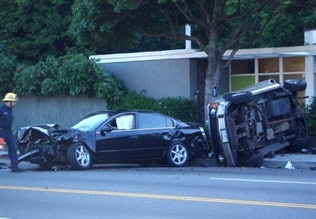 Photo courtesy of 7-how-7/Flickr.
Photo courtesy of 7-how-7/Flickr.
Editor's Note: This blog post first appeared on the Los Angeles Police Protective League's website.
We've been warning for a long time that suspended or revoked and unlicensed drivers were a public safety menace. That's why we opposed the LAPD directive not to impound for 30 days vehicles of unlicensed drivers. The politics-above-public-safety policy puts innocent people at risk of being injured and killed on Los Angeles streets.
City officials choose not to believe the very police officers who investigate vehicle crashes in Los Angeles and instituted a policy that ignores state law. Perhaps they now will listen to the DMV.
The LAPPL welcomes a new study by the California Department of Motor Vehicles, "Fatal Crash Rates for Suspended/Revoked and Unlicensed Drivers," which found suspended or revoked and unlicensed drivers are much more reckless on the road than validly licensed drivers. The study found that unlicensed drivers are nearly three times more likely to cause a fatal crash than licensed drivers. The study also found that unlicensed drivers are more hazardous than drivers with suspended or revoked licenses. Some of the key findings of the DMV study are:
- Compared to validly licensed drivers, suspended, revoked and unlicensed drivers are 2.60 and 2.73 times more likely to cause a fatal crash relative to their exposure.
- The largest percentage of suspended, revoked, and unlicensed drivers involved in fatal, two-vehicle crashes is those aged 20 to 29.
- For drivers aged 19 or younger in fatal, two-vehicle crashes, the percentage that consisted of unlicensed drivers was almost four times higher than the percentage that was suspended or revoked.
- The actual number of unlicensed drivers in California is unknown because these drivers are unknown to the DMV until they are involved in a crash or convicted of a traffic violation.
There are two fundamental reasons why vehicle impounding of unlicensed drivers is smart law enforcement. First, an unlicensed driver willing to ignore the law is, at least temporarily, less likely to further violate this law because he or she will not have access to the impounded vehicle. Second, the cost and inconvenience of recovering an impounded vehicle discourages people without licenses from driving. That is precisely why the state legislature enacted the 30-day hold law.
Don Rosenberg started the website Unlicensed to kill to bring attention to the horrendous problem of unlicensed drivers after his son Drew was killed by Roberto Galo, an unlicensed driver. His traffic safety whitepaper details the issue and points out that last year 7,500 people were killed by unlicensed drivers. Rosenberg was the first to point out that nationally 11% of all police reported crashes involve a hit-and-run collision, while in Los Angeles, 44% of all traffic collisions are due to hit-and-runs.
LA Weekly's excellent investigation, "L.A.'s Bloody Hit-and-Run Epidemic," exposed what they call an epidemic of hit-and-run crashes in the city of Los Angeles that number over 20,000 a year. According to the story, nearly half of all the crashes in L.A. are hit-and-runs.
L.A.'s policy of skirting state law substantially reduces the disincentives against the unlicensed and unlawful operation of a vehicle. It is our hope that in the new year, the DMV study will be the impetus for city officials to revisit this issue and in so doing, show that they are serious about putting public safety first.














